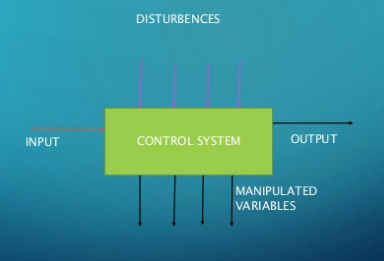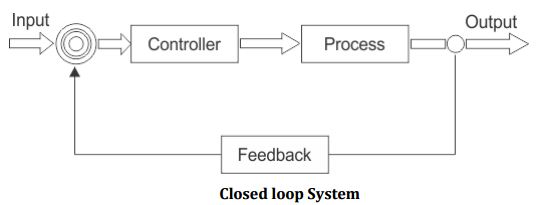Control system engineering is the branch of engineering which deals with the principles of control theory to design a system which gives desired behavior in a controlled manner.
A controlled system consists of highly integrated coordination of mechanical, electrical, chemical, metallurgical, electronic or pneumatic elements.
System Control engineering deals with diverse range of dynamic systems which include human and technological interfacing.
Control system engineering focuses on analysis and design of systems to improve the speed of response, accuracy and stability of system.
The two methods of control system include classical methods and modern methods. The mathematical model of system is set up as first step followed by analysis, designing and testing.

Closed Loop Open Loop Control Systems
Open Loop Control System: A control system in which the control action is totally independent of output of the system then it is called open loop control system.
Manual control system is also an open loop control system.
Below figure shows the block diagram of open loop control system in which process output is totally independent of controller action.

Open Loop control system
Practical Examples of Open Loop Control Systems
- Electric Hand Drier – Hot air (output) comes out as long as you keep your hand under the machine, irrespective of how much your hand is dried.
- Automatic Washing Machine – This machine runs according to the pre-set time irrespective of washing is completed or not.
- Bread Toaster – This machine runs as per adjusted time irrespective of toasting is completed or not.
- Automatic Tea/Coffee Maker – These machines also function for pre adjusted time only.
- Timer Based Clothes Drier – This machine dries wet clothes for pre – adjusted time, it does not matter how much the clothes are dried.
- Light Switch – lamps glow whenever light switch is on irrespective of light is required or not.
- Volume on Stereo System – Volume is adjusted manually irrespective of output volume level.
Advantages of Open Loop Control Systems
- Simple in construction and design.
- Economical.
- Easy to maintain.
- Generally stable.
- Convenient to use as output is difficult to measure.
Disadvantages of Open Loop Control Systems
- They are inaccurate.
- They are unreliable.
- Any change in output cannot be corrected automatically.
Closed Loop Control System
This is a control system in which the output has an effect on the input quantity in such a manner that the input quantity will adjust itself based on the output generated.
Open loop control system can be converted in to closed loop control system by providing a feedback.
This feedback automatically makes the suitable changes in the output due to external disturbance.
In this way closed loop control system is called automatic control system.
Figure below shows the block diagram of closed loop control system in which feedback is taken from output and fed in to input:

Practical Examples of Closed Loop Control System
- Automatic Electric Iron – Heating elements are controlled by output temperature of the iron.
- Servo Voltage Stabilizer – Voltage controller operates depending upon output voltage of the system.
- Water Level Controller– Input water is controlled by water level of the reservoir.
- Missile Launched & Auto Tracked by Radar – The direction of missile is controlled by comparing the target and position of the missile.
- Air Conditioner – An air conditioner functions depending upon the temperature of the room.
- Cooling System in Car – It operates depending upon the temperature which it controls.
Advantages of Closed Loop Control System
- Closed loop control systems are more accurate even in the presence of non-linearity.
- Highly accurate as any error arising is corrected due to presence of feedback signal.
- Bandwidth range is large.
- Facilitates automation.
- The sensitivity of system may be made small to make system more stable.
- This system is less affected by noise.
Disadvantages of Closed Loop Control Systems
- They are costlier.
- They are complicated to design.
- Required more maintenance.
- Feedback leads to oscillatory response.
- Overall gain is reduced due to presence of feedback.
- Stability is the major problem and more care is needed to design a stable closed loop system.
Types of Control Engineering
Control engineering has its own categorization depending on the different methodologies used, which are as follows.
Classical Control Engineering:
The systems are usually represented by using ordinary differential equations.
In classical control engineering, these equations are transformed and analyzed in transformed domain.
Laplace transform, Fourier transform and z transform are examples.
This method is commonly used in Single Input Single Output systems.
Modern Control Engineering:
In modern control engineering higher order differential equations are converted to first order differential equations.
These equations are solved very similar to vector method.
By doing so, many complications dealt in solving higher order differential equations are solved.
These are applied in Multiple Input Multiple Output systems where analysis in frequency domain is not possible.
Non linearity with multiple variables are solved by modern methodology.
State space vectors, Eigen values and Eigen Vectors longs to this category.
State Variables describe the input, output and system variables.
Robust Control Engineering:
In robust control methodology, the changes in performance of system with change in parameters are measured for optimization.
This aids in widening the stability and performance, also in finding alternate solutions.
Hence in robust control the environment, internal inaccuracies, noises and disturbances are considered to reduce the fault in system.
Optimal Control Engineering:
In optimal control engineering, the problem is formulated as mathematical model of process, physical constraints and performance constraints, to minimize the cost function.
Thus optimal control engineering is the most feasible solution for designing a system with minimum cost.
Adaptive Control Engineering:
In adaptive control engineering, the controllers employed are adaptive controllers in which parameters are made adaptive by some mechanism.
The block diagram given below shows an adaptive control system.
Nonlinear Control Engineering:
Non linear control engineering focuses on the non linearity’s which cannot be represented by using linear ordinary differential equations.
This system will exhibit multiple isolated equilibrium points, limit cycles, bifurcations with finite escape time.
The main limitation is that it requires laborious mathematical analysis.
In this analysis the system is divided into linear part and non linear part.
Game Theory: In game theory, each system will have to reduce its cost function.
Discover more from Electrical Engineering 123
Subscribe to get the latest posts sent to your email.

